Peaky Blinders is a board game lightly inspired by the historical television drama series of the same name, in turn lightly inspired by an actual Birmingham gang of the same name. Put on your paddy cap or bonnet, pour yourself a glass and try to put on a bad imitation of these Brummie boys, just like everyone who has ever heard of this series. Can you really be a gangster, or will you soon be under new management, by order of the Peaky Fookin’ Blinders?
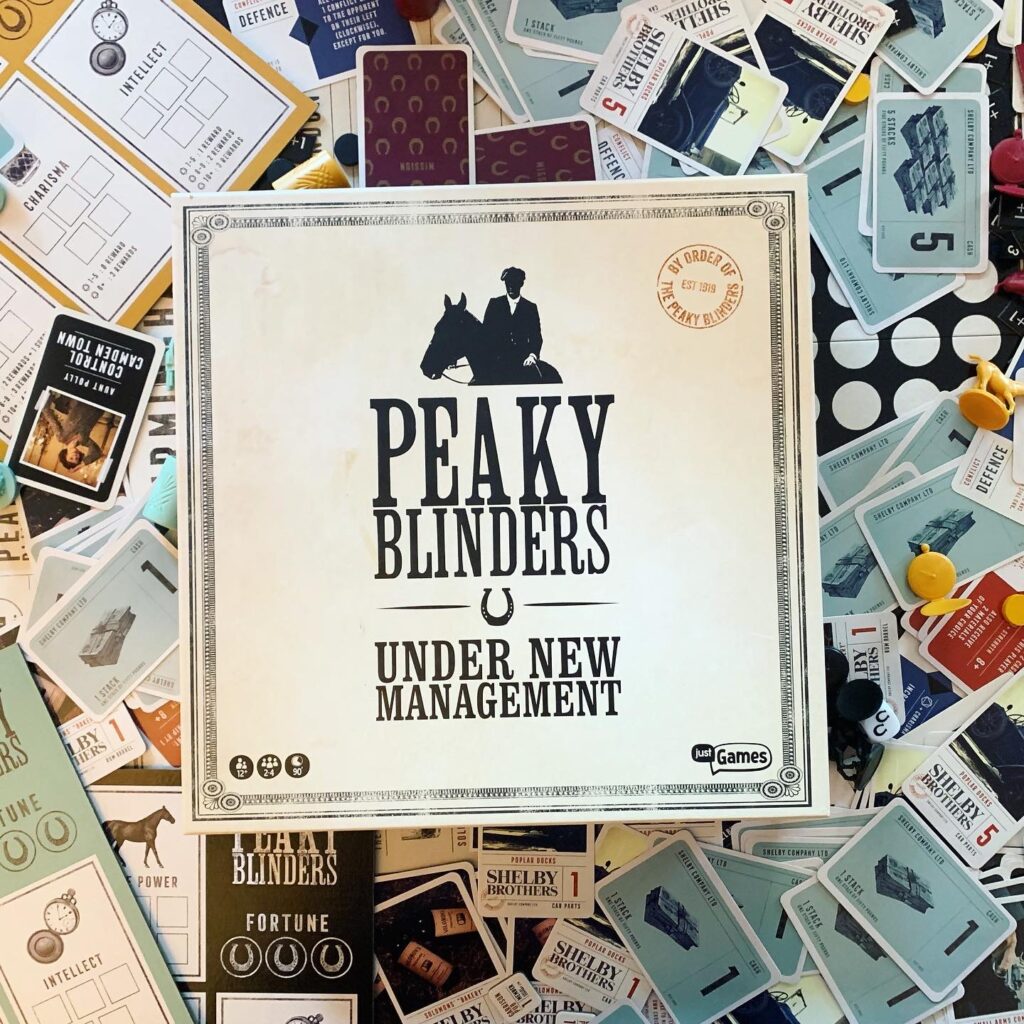
In Peaky Blinders, the players perform a number of steps/actions in a total of 4 zones, after which they have to bet at the horse races. Each player has three random assignments and the player who completes his/her assignments first wins. Players all have a player board with several skills and three playing figures (the henchmen). The game board consists of different zones. The zones correspond to actions that players can take. By placing a henchman, players can perform an action and earn the corresponding reward. Players have a total of three henchmen, a revolver that represents strength, a whisky tumbler that personifies charisma and a pocket watch for intelligence. Apparently a gun makes one strong, liquor makes one charismatic and a sense of time makes one intelligent?
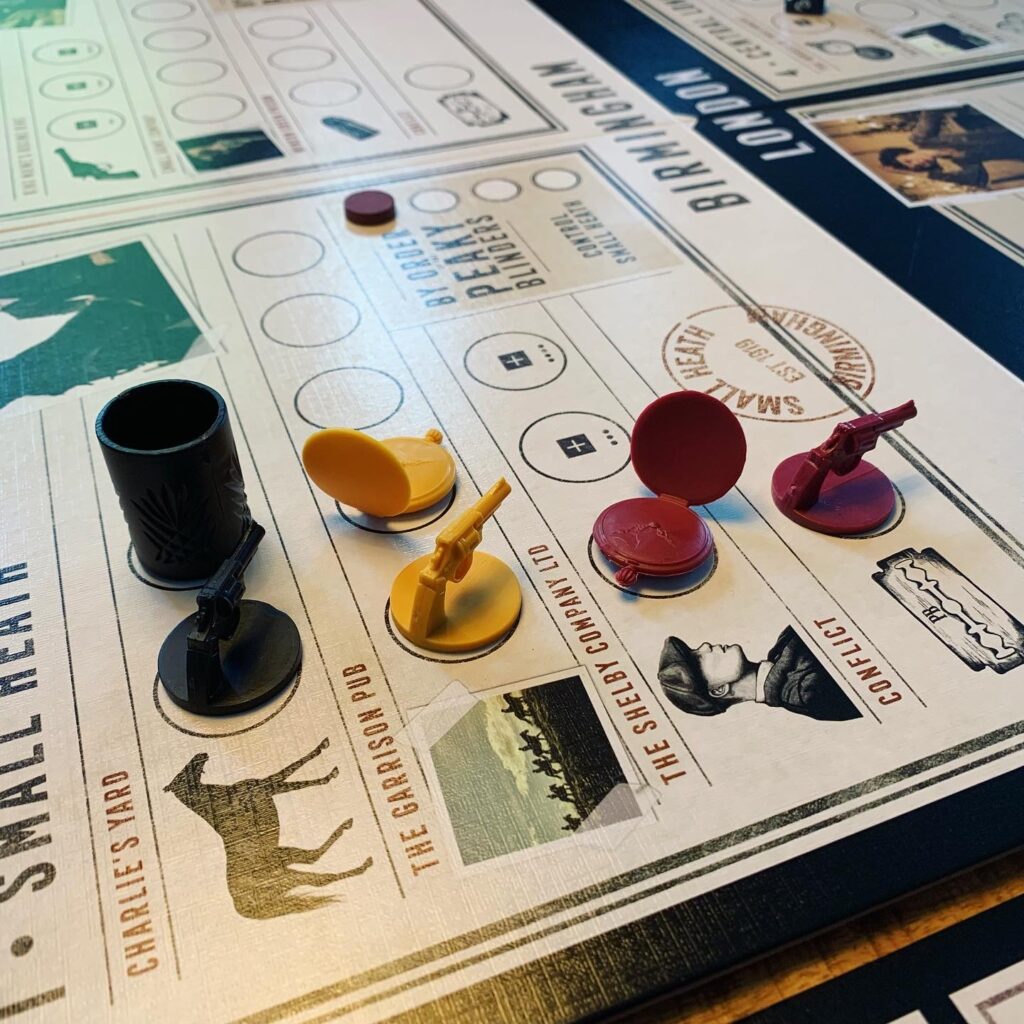
The player with the most leadership skill points may begin. Players take turns placing a henchman and then rolling a die and based on the roll they receive x number of somewhere. This can vary from zone to zone, but often comes down to goods, money, club members or skill points. Some players have to collect goods to reach their goals, but otherwise these goods are only used to exchange for money if necessary. In addition, players must control zones, which they do by discarding money to place a token. You can also thwart another player by using a conflict action after which players roll dice to determine a battle. They add up the skills of the chosen henchman, their club members and the dice roll. The losing party loses leadership and the winner takes an opportunity card and may discard an opponent’s control token.
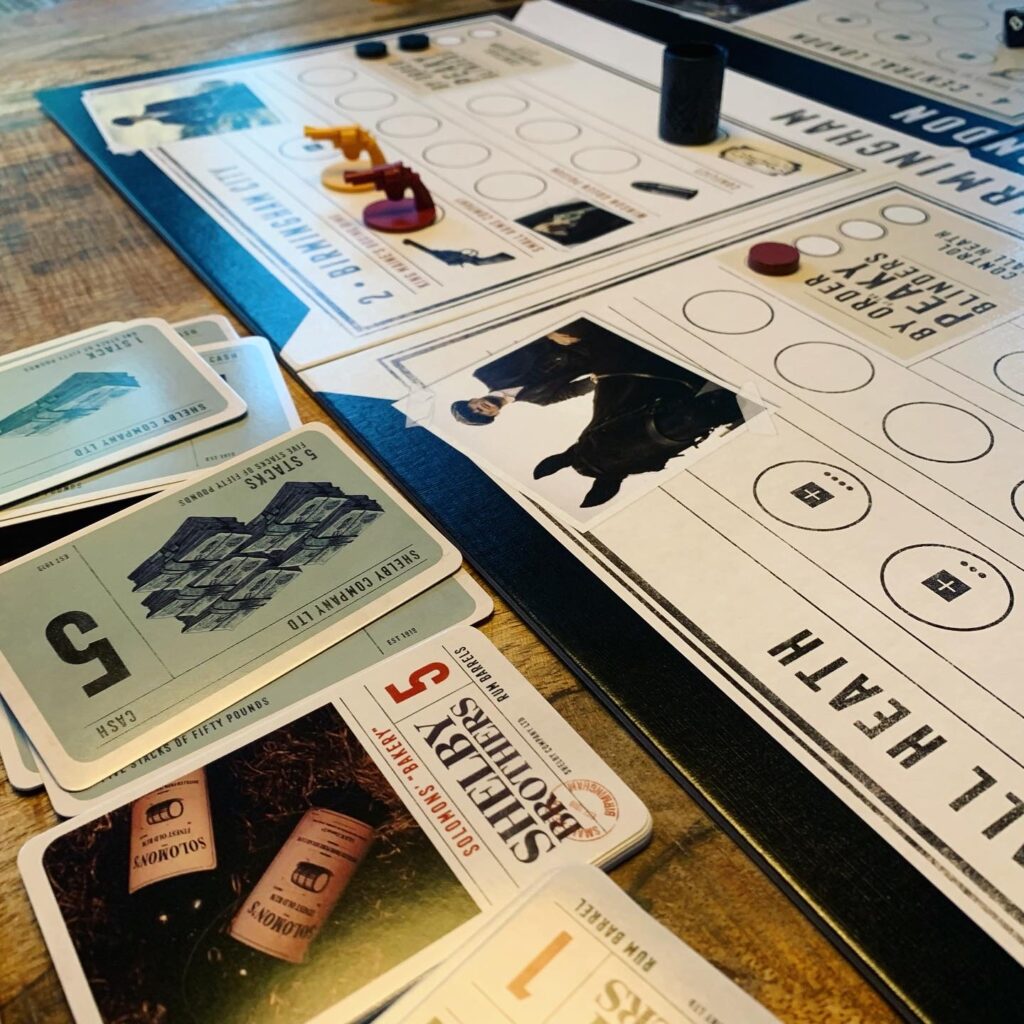
In each zone, players place their henchmen, roll dice, get rewards and move on to the next zone where they repeat these steps. After completing 4 zones, players move on to the horse race. Here they will play a shortened version of goose board. The player who gets his/her horse across the finish line first, wins money based on his/her club members. This repeats itself until one player has achieved all three goals. This can take a very long time, especially since you often take the same actions during the game.
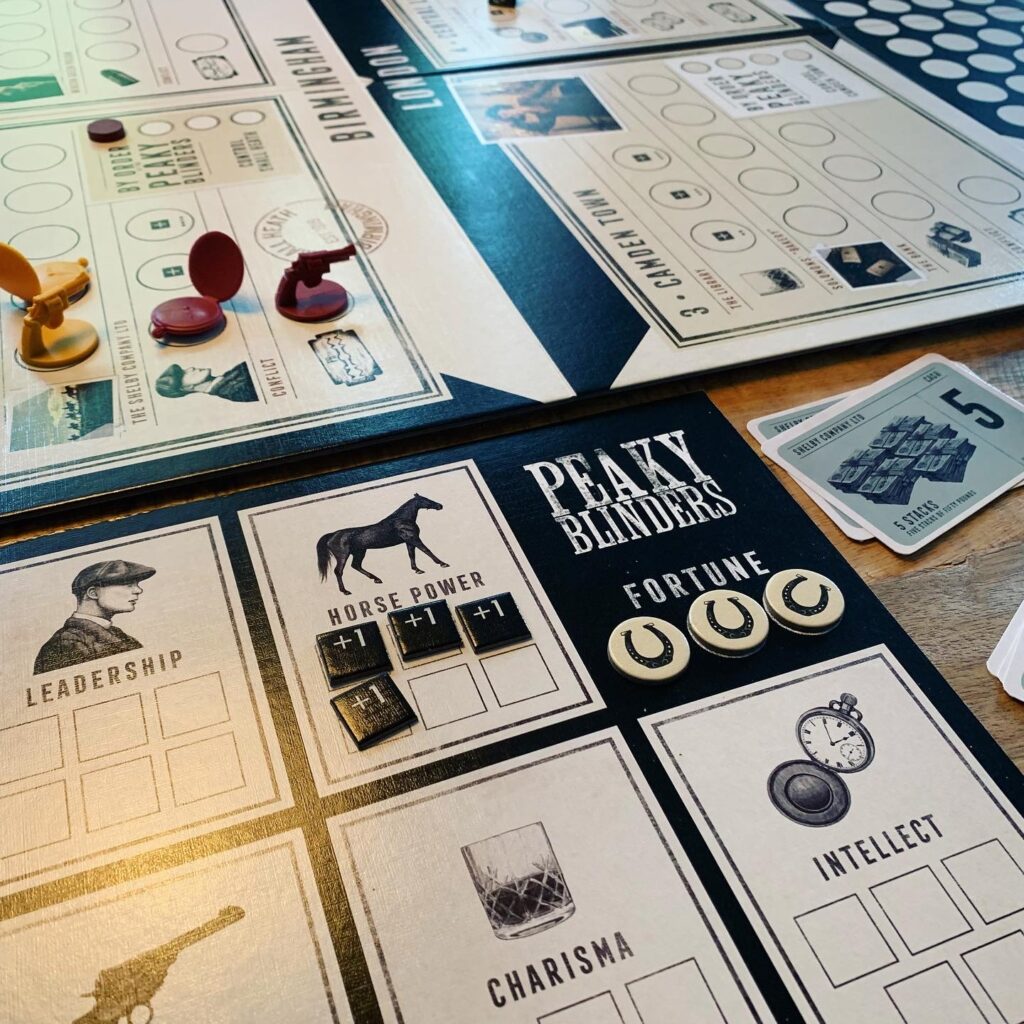
Peaky Blinders contains an interesting gameplay mechanism in that your three henchmen all have a different risk/chance ratio. To see which one earns the reward, you must roll a die and depending on the henchman, you obtain rewards. The probability distribution differs per henchman. If you go for strength (the gun), you can get rewards more easily, but your gun may end up in prison while with charisma, you may get no reward at all or recieve a very large reward. I would like to see this mechanic used in another game, because it could possibly bring interesting choices, but in this game the balance is missing. In practice it doesnt feel like there is an actual differecne between the henchmen that would effectivly affect the gameplay and players can “upgrade” their henchmen with skill points. These are rewards that you collect. After a while, a henchman almost always earns you the best rewards. Leadership can also be upgraded and that player can start each round. Since upgrading leadership is one of the first actions players might undertake and there is only limited space for henchmen on the game board, one player has an advantage early on in the game and a player who takes his turn later has a considerable disadvantage. This player can quickly be blocked from taking certain actions. Combined with the long playing time, this can quickly lead to frustration.
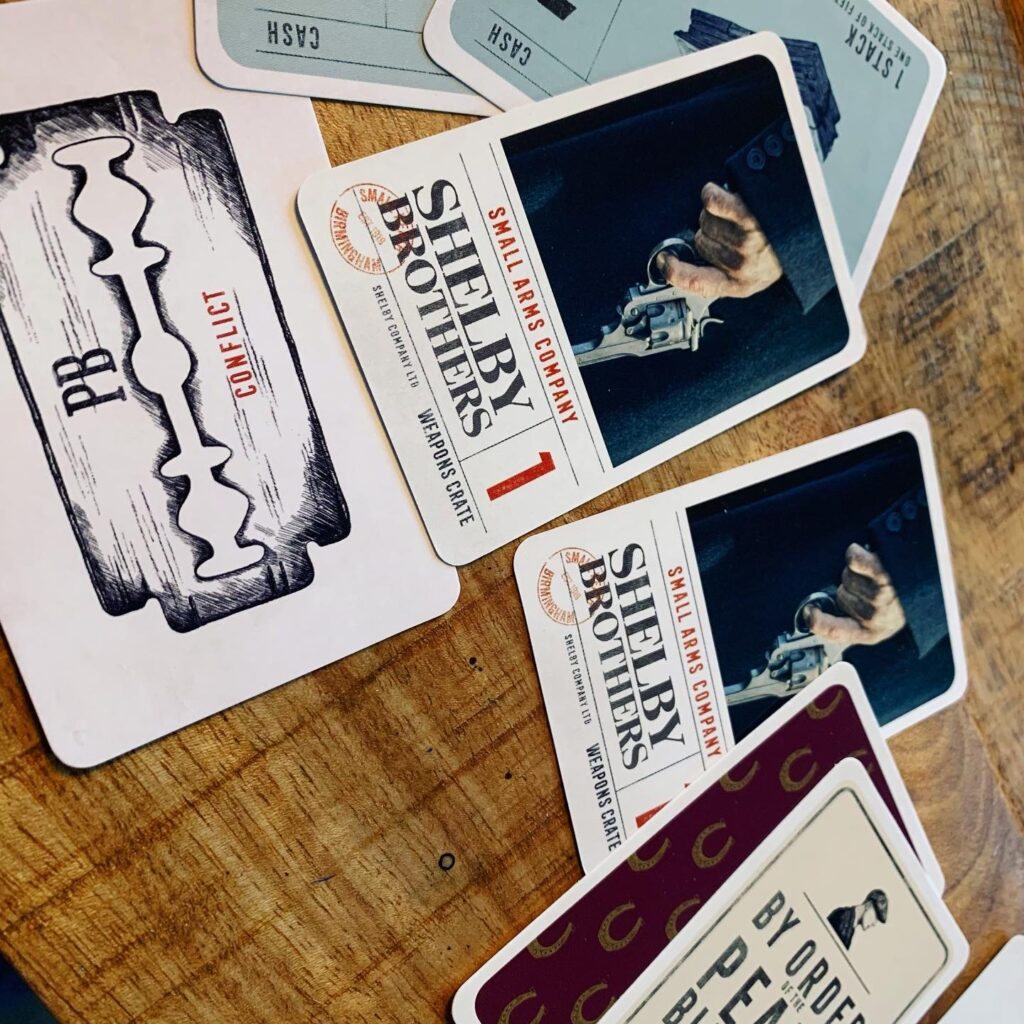
Time to grab your glass of whisky and put on a Brummie accent, along with the Peaky Blinders board game? If it were up to me, I’d stick with the first two. Although the game has been given a theme, the actual elaboration of the theme is lacking. You don’t play with the Peaky Blinders and you don’t meet them in the game other than on some pictures on the board. Are you playing a Peaky Blinder, or are you just in the loop? Are you playing against each other or against outside influences? The game leaves the theme in the middle. Also missing is the heartof the Peaky Blinders: Thomas Shelby who thinks ahead and thus always stays one step ahead of his opponents. In the board game, at least 75% of the game is based on luck, including dice rolls, your location at the table and the random secret objectives, so ‘wins’ have very little influence. In addition, the order of the first round heavily determines the course of the game – if you start last, there is a good chance that ‘early upgrades’ will be “stolen” from you. It’s a pity, because the theme would have had a lot of potential with a bit more elaboration: bribery, manipulation and more fighting between players would have done the game a lot of good. As Wint Polly aptly said, “Rule one: you don’t punch above your weight.”



